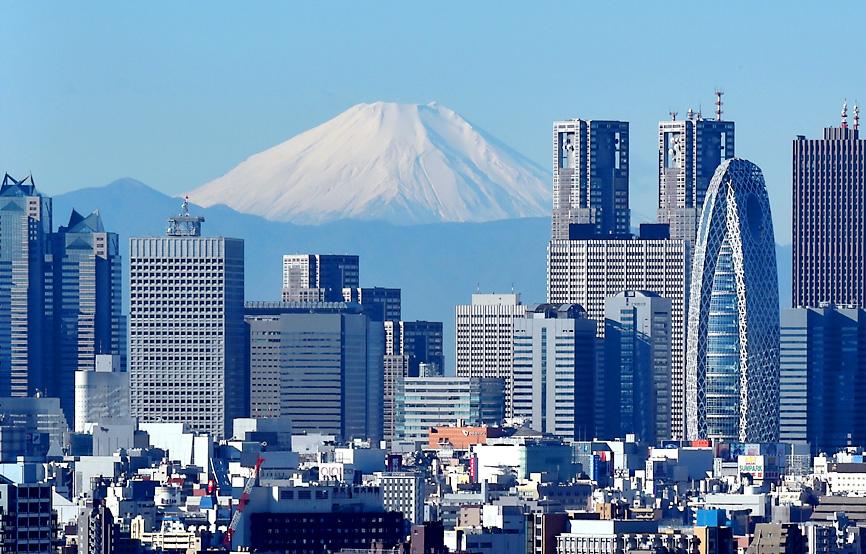Tokyo is on a charm offensive, hoping to lure Hong Kong firms spooked by protests and a controversial National Security Law imposed by China. However, the city is proving a tough sell.
“I want to make Tokyo Asia’s No. 1 financial city,” Tokyo Governor Yuriko Koike said last month, as the Japanese capital opened an information center in Hong Kong for international businesses considering a move.
Tokyo’s courtship comes with some concrete promises, including temporary offices for firms that want to try out life in Japan.

Photo: AFP
There are also a number of more theoretical incentives being floated, including tax breaks, streamlined bureaucracy and even a special economic zone like Shenzhen, China’s “Silicon Valley.”
In some ways, Japan might seem an obvious alternative for businesses looking to leave Hong Kong: It is the world’s third-largest economy, home to the Tokyo Stock Exchange, and already houses outposts of numerous financial institutions and international firms.
However, there are some serious stumbling blocks and competitors that experts say mean Tokyo’s hopes for regional financial dominance might be little more than a pipe dream.
For a start, Japan’s income taxes are sky high, comparatively, topping out at 45 percent against Singapore’s 22 percent and Hong Kong’s 17 percent.
Low English fluency levels are also a chronic handicap, as is the country’s comparatively sluggish adoption of digital technology.
Trade on Tokyo’s stock markets was halted for an entire day last month because of a “hardware failure” — a glitch seen as unlikely to boost confidence and bring new traders flocking.
European Business Council in Japan president Michael Mroczek said that there were high hopes for Japanese Prime Minister Yoshihide Suga’s digitization and deregulation push.
However, “there’s also a lot of skepticism because there haven’t been a lot of changes” over the past few years when similar initiatives have been proposed, he added.
Japan’s particularly strict approach to border controls during the COVID-19 pandemic — when foreign residents were for months not allowed to return even as Japanese citizens did — has been seen by some as discrimination and could also be off-putting for tentative transplants, Mroczek said.
Tokyo is not the only city in the Asia-Pacific region that seeks to take advantage of a potential Hong Kong exodus.
Australia has announced new visa opportunities for Hong Kong students and entrepreneurs, and officials have said that they would be “very proactive” in encouraging businesses to relocate.
While the Singaporean government officially only says that it seeks a “stable, calm and prosperous” Hong Kong, it is probably the most obvious alternative for firms, IHS Markit chief economist for Asia-Pacific Rajiv Biswas said.
“Most international financial services firms may already have a large presence in Singapore, and therefore may prefer to expand their existing operations in Singapore rather than finding another new location,” Biswas said.
However, there are still questions about whether an exodus from Hong Kong is really on the cards, whichever regional city stands to gain.
“I wouldn’t expect big firms to announce that they are pulling out of Hong Kong completely,” Capital Economics Ltd chief Asia economist Mark Williams said. “It’s more likely that firms will just gradually reduce their headcount in Hong Kong and increase it elsewhere.”
Since 2014, the Hong Kong stock exchange has been directly connected to Shanghai’s, allowing companies based in the territory to invest in companies listed in mainland China more easily. Hong Kong’s proximity to Shenzhen is another important plus for some businesses.
“Wait and see is the general attitude,” one foreign employee at a major Western bank in Hong Kong said on condition of anonymity, adding that he personally was not yet thinking about relocating.

NEW IDENTITY: Known for its software, India has expanded into hardware, with its semiconductor industry growing from US$38bn in 2023 to US$45bn to US$50bn India on Saturday inaugurated its first semiconductor assembly and test facility, a milestone in the government’s push to reduce dependence on foreign chipmakers and stake a claim in a sector dominated by China. Indian Prime Minister Narendra Modi opened US firm Micron Technology Inc’s semiconductor assembly, test and packaging unit in his home state of Gujarat, hailing the “dawn of a new era” for India’s technology ambitions. “When young Indians look back in the future, they will see this decade as the turning point in our tech future,” Modi told the event, which was broadcast on his YouTube channel. The plant would convert

‘SEISMIC SHIFT’: The researcher forecast there would be about 1.1 billion mobile shipments this year, down from 1.26 billion the prior year and erasing years of gains The global smartphone market is expected to contract 12.9 percent this year due to the unprecedented memorychip shortage, marking “a crisis like no other,” researcher International Data Corp (IDC) said. The new forecast, a dramatic revision down from earlier estimates, gives the latest accounting of the ongoing memory crunch that is affecting every corner of the electronics industry. The demand for advanced memory to power artificial intelligence (AI) tasks has drained global supply until well into next year and jeopardizes the business model of many smartphone makers. IDC forecast about 1.1 billion mobile shipments this year, down from 1.26 billion the prior

People stand in a Pokemon store in Tokyo on Thursday. One of the world highest-grossing franchises is celebrated its 30th anniversary yesterday.

Zimbabwe’s ban on raw lithium exports is forcing Chinese miners to rethink their strategy, speeding up plans to process the metal locally instead of shipping it to China’s vast rechargeable battery industry. The country is Africa’s largest lithium producer and has one of the world’s largest reserves, according to the US Geological Survey (USGS). Zimbabwe already banned the export of lithium ore in 2022 and last year announced it would halt exports of lithium concentrates from January next year. However, on Wednesday it imposed the ban with immediate effect, leaving unclear what the lithium mining sector would do in the